We are all watching in horror the fires raging in the Amazonian forest, people on social media decry the destruction of our planet’s ‘lungs’, there are calls to action as our future is at risk. While we are perfectly justified in being worried about our future, for the people that call the Amazonian forest their home, their present is at risk. The sad thing is the plight of the 400 native tribes that live in the area has been ignored for decades. Deforestation and forest fires are not something knew to them. They have been pushed out of their homes and killed by ruthless contractors for many years and nobody cared, except for a few human rights organizations nobody one listens to anyway. It is only now that the very air we breathe is in danger that we take note of the situation in Brazil.
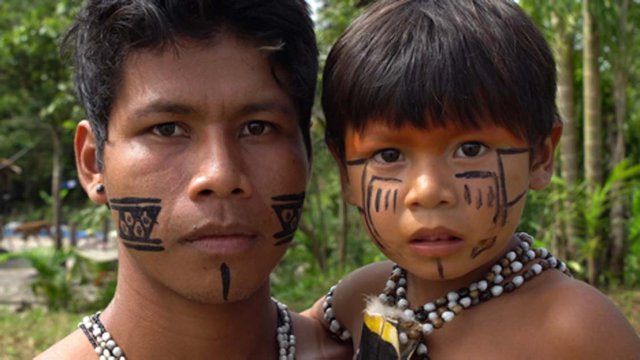
The Mura are but one of the tribes whose existence is threatened by the fires. Their people“painted their bodies with orange-red paint and took up long bows and clubs as they headed into the jungle this week, prepared for battle”, although their rudimentary weapons cannot tackle the huge fires.
Their leader, 73-year old Raimundo Praia Belem Mura is ready to die for his home:
“For this forest, I will go on until my last drop of blood.”
Over the years, they have tried many times to seek justice, but have been unable to stop the logging companies that are putting down everything in their paths, including the Brazilian nut trees the Mura have been harvesting for generations.
The Pataxo tribe tells the same story. Now that everybody is suddenly interested in the Amazonian forest, television crews came to their area to listen to their complaints.
“They are killing our rivers, our sources of life, and now they have set our reserve on fire”, one Pataxo woman said.
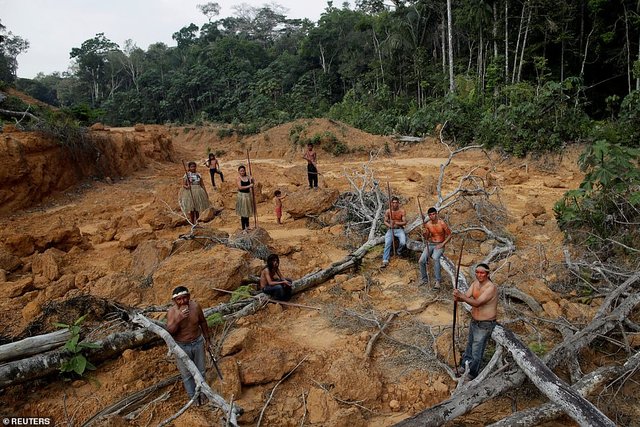
Perhaps the saddest thing in this tragic story is the fate of the uncontacted tribes in the Amazonian forest, whose lives are in danger because of the actions of people they’ve never met. Some of the natives leading a primitive life deep in the forest have literally no idea about any of us, our civilization, if we can call it that. One of these days they might be killed because somebody needs to clear that land, to raise cattle, beef exports being an important part of Brazilian economy. Most of the Brazilian beef goes to Asia and Europe. Just imagine a primitive man dying one day just so a family in Honk Kong can have a nice juicy steak for dinner.
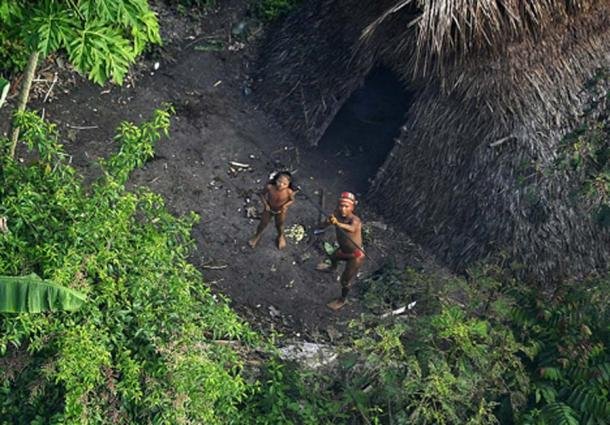
The kids in the image above are members of one of these uncontacted tribes in the Amazonian forest.
It is thought humans have settled the Amazon some 13,000 years ago.
“The uncontacted peoples are hunter-gatherers and subsistence farmers living deep in the western Amazon, a relatively stable ecosystem with enormous diversity in plant life as well as mammal, amphibian, and bird species. The uncontacted people live by fishing along the rivers, collecting turtle eggs, and hunting animals in the forest. Some groups will also practice subsistence agriculture, farming at least part of the year. Some are nomadic while others live in small settlements.”
Since their lives depend on the ecosystem, they are good conservationists, unlike the people who decide to clear out the land, who live probably very far away, somewhere in the big city.
Although we generally imagine the Amazon to be a pristine wilderness, archaeological works revealed evidence of towns and possibly big cities that once might have existed there.
"The human population in the Amazon appears to have been much larger in prehistory. It is possible that entire civilizations once flourished within the vast 6 million square kilometer rainforest."
Experts believe some of the tribes deliberately chose to remain isolated. Following the arrival of the European conquerors, many tribes were subjugated and enslaved. Many died in wars or from the unknown disease the white men brought with them.
The threats remain the same in modern times. For instance, in the 1980s, the Nahua tribe in the Peruvian part of the Amazonian forest were accidentally contacted by a Shell exploration team. Within a few years, half of the people had died from hepatitis B and tuberculosis.
Before white people ventured into their territory, the Nahua had a long history and their people still carry a wealth of ancient legends. One of the oldest Nahua legend speaks of a mythical place called Tamoanchan, considered to be the cradle of all Mesoamerican civilizations and a sort of terrestrial paradise from which the ancestors of the Aztecs and the Toltecs would go out to repopulate the earth after The Great Flood.
"They say the came to this land to rule over it, they came from the sea on ships, a multitude of them, and landed on the shore of the sea, to the North, from there they went on, seeking the white mountains, the smoky mountains, led by their priests and by the voice of their gods. Finally, they came to the place that they called Tamoanchan and there they settled .”
I find the above quote fascinating, as those are the things that I normally like to write about in my folklore and history posts, but uncovering the past seems less important today as these people are fighting for survival. Incidentally, I don't remember much of an outrage as the natives of the Peruvian rainforest, like the Nahua, lost their homes to oil companies.
The same thing happened to the Matis people, first contacted in 1978. Five years later, most of them were dead from various diseases. Only 87 of them survived, but the tragedy changed them to the point that they stopped practicing their ceremonies and even refused to bring other babies into this world. They’ve managed to survive to this day, but just barely.
There have been cases in which illegal loggers venturing into native territories have been killed, but most often it’s the other way around. I remember a few years ago reading a report from a human rights organization concerning loggers being overheard talking about the execution of native people they had encountered. That discussion was a casual one, taking place in a bar in one of the logger-towns. The story was reported by many papers worldwide, but there was no effort from the local authorities to trace the killers and bring them to justice.
Besides these people, the Amazon is home to many other life forms, both known and unknown animals, insects and plants, that are all in danger.
As ecologist and Amazon expert Adriane Muelbert put it:
“It’s a tragedy, a crime against the planet and a crime against humankind.”
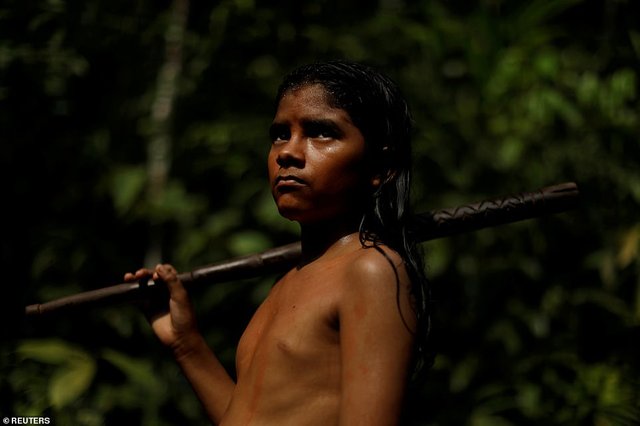
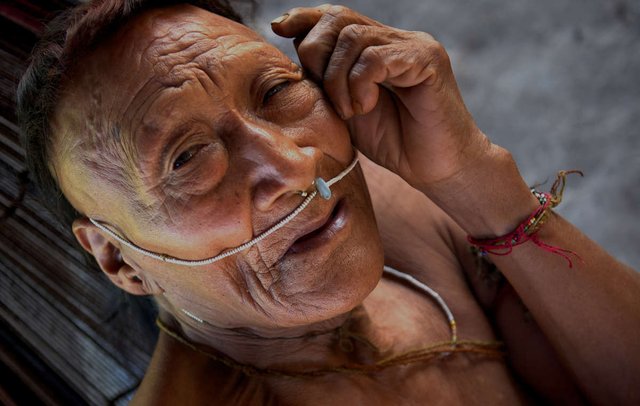
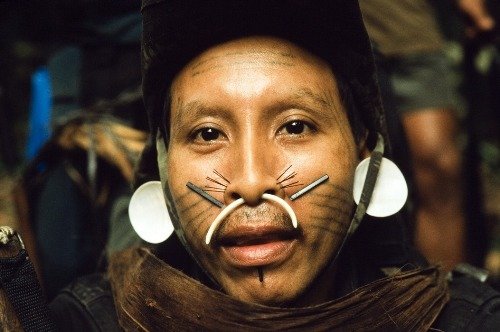
It is painful to see that it is necessary for great tragedies to occur in order for certain problems to be spoken of! In Venezuela, at the moment, there are more than 30 indigenous ethnic groups that have had to leave their territory because of the indiscriminate exploitation of resources. The worst of all is that in Venezuela the worst destruction is being driven by the government itself with its mining policy in the states of Bolivar and precisely Amazonas. Mining is destroying and contaminating rivers, forests and even people. At the beginning of this year, the sexual exploitation of indigenous girls and young women by men working in mining was denounced. The denunciations are serious, but unfortunately there must be great tragedies for them to be taken into account. Thank you for bringing such up-to-date information, @ladyrebecca.
Downvoting a post can decrease pending rewards and make it less visible. Common reasons:
Submit
Thank you for saying something. It is horrible that the 'world' is only worried when it concerns them. They don't even realize the number fires that happen on a regular basis in the Amazon. Most think of it as uninhabitable because it is not a place they would want to live. Hopefully since they are getting media attention they will get the help they need. Hopefully the missionaries will allow them to live in peace as well.
Downvoting a post can decrease pending rewards and make it less visible. Common reasons:
Submit
Excellent post. Political correctness and self-indulgence can be a double edge sword.
Like the indigenous people in the amazons, many poor peoples around the world, whether indigenous or not have ben suffering for years the ruthlessness of consmerism and ambition.
Many people say they care about certain causes, but when it comes to doing something about it, it is little what they'd be willing to sacrifice for those causes.
Every day people die so that idiotic luxuries continue being shared by idiotic people.
Most people somehow partake of those vices through the social media, by following celebrities that promote the kind of consumerism and self-agrandizement that cares little about noble causes and justice.
Downvoting a post can decrease pending rewards and make it less visible. Common reasons:
Submit
Inland tribes who guard nature with all its ecosystems are always objects of modernity. They really play a big role in caring for the forest. They are also ultimately blamed for not following modernization. They sometimes become more of the blame. In fact, if all look at what they have fought for, then our hearts will become understood, our brains will become open. we will certainly recognize the magnitude of their services.
however, often due to our selfish attitudes, the attitude of the government and the people who see them only as the cause of our ignorance and then lose our will and kill our heart. We treat the forest that they have glorified cruelly. How illegal logging has destroyed the ecosystem. How the destruction of the forest has also taken their lives. They are often victims without us knowing.
Therefore, let us open our hearts and our minds so that we can together protect nature for our children and grandchildren later.
thank you @ladyrebecca
thank you @adsactly
Thank you Steemit
Warm regard from Indonesia
Downvoting a post can decrease pending rewards and make it less visible. Common reasons:
Submit
Very necessary and pertinent your post, more at this time, @ladyrebecca. Most of the time the concern for the Amazon does not go beyond a slogan, such as "The Amazon is the lung of the planet. And certainly, as you say, the destruction of that habitat, of its people, animals and nature in general is old. And local governments, foreigners, regional and international companies are all involved. On the Venezuelan side, there is the enormous problem with the so-called "Mining Arc," which has been denounced.
One of the Amazonian ethnic groups that has remained furthest from the destructive effects of Western civilization has been the yanomami, the so-called "sons of the moon". There is a beautiful book about this ethnic group entitled The circle of fires by anthropologist Jacques Lizot and an extraordinary documentary film entitled The initiation of a shaman (which I don't know if it will be on youtube), illustrates very well this survivor of Amazonian culture.
Thanks for your good post, @ladyrebecca.
Downvoting a post can decrease pending rewards and make it less visible. Common reasons:
Submit
I remember watching a movie called apocalypto...it reminds me of such people
Posted using Partiko Android
Downvoting a post can decrease pending rewards and make it less visible. Common reasons:
Submit
The cruelty of man! That these peoples are not TREASURED baffles me. I can certainly understand some of these tribs wanting to stay isolated! The magic and soul of their lives are threatened.
Excellent post as always @ladyrebecca, I love what you do. The research, photos, insights are treasures of themselves.
Downvoting a post can decrease pending rewards and make it less visible. Common reasons:
Submit